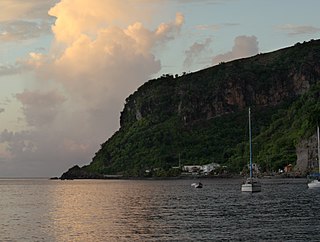The Arawaks were guided to Dominica, and other islands of the Caribbean, by the South Equatorial Current from the waters of the Orinoco River. These descendants of the early Taínos were overthrown by the Kalinago tribe of the Caribs.

The politics of Dominica takes place in a framework of a parliamentary representative democratic republic, whereby the Prime Minister of Dominica is the head of government, and of a multi-party system. Executive power is exercised by the government. Legislative power is vested in both the government and the House of Assembly. The Judiciary is independent of the executive and the legislature.

Elections in Dominica have been taking place since 1832. Dominica elects on national level a legislature. The House of Assembly has 32 members, 21 members elected for a five-year term in single-seat constituencies, 9 appointed senators, the Speaker and 1 ex officio member. a head of state - the president - is elected by the House of Assembly.

The Dominica Labour Party is a centre-left social-democratic political party in Dominica.
The United Workers' Party is a centrist political party in Dominica. As of the 2009 general election, it is the only opposition party represented in the House of Assembly of Dominica, holding three of the twenty-one seats. Its past Leader of the Opposition in the Assembly is Hector John.

Dame Mary Eugenia Charles, was a Dominican politician who was Prime Minister of Dominica from 21 July 1980 until 14 June 1995. The first woman lawyer in Dominica, she was Dominica's first, and to date only, female prime minister. She was the second female prime minister in the Caribbean after Lucina da Costa of the Netherlands Antilles. She was the first woman in the Americas to be elected in her own right as head of government. She served for the longest period of any Dominican prime minister, and was the world's third longest-serving female Prime Minister, behind Indira Gandhi of India and Sirimavo Bandaranaike of Sri Lanka. She established a record for the longest continuous service of any woman Prime Minister.
Charles Angelo Savarin is a politician from Dominica who has been President of Dominica since 2013. He is a member of the Dominica Labour Party and served for a time as Minister for National Security, Immigration, Labour and the Public Service.

The House of Assembly is the legislature of Dominica. It is established by Chapter III of the Constitution of Dominica, and together with the President of Dominica constitutes Dominica's Parliament. The House is unicameral, and consists of twenty-one Representatives, nine Senators, and the Attorney General as an ex officio member. The Speaker of the House becomes the thirty-second member if chosen from outside the membership of the House.

General elections were held in Dominica on 5 May 2005. The result was a victory for the ruling Dominica Labour Party, which won 12 of the 21 seats in the House of Assembly. The opposition United Workers' Party unsuccessfully made legal challenges to several of the constituency results.

General elections were held in Dominica on 31 January 2000 and saw the Dominica Labour Party led by Rosie Douglas take power defeating the previous government of the United Workers' Party led by Edison James, despite the UWP receiving more votes. The DLP won 10 seats, the UWP 9 seats and the Dominica Freedom Party took 2 seats. Voter turnout was 59.25%. The Dominica Labour Party formed a government in coalition with the Dominica Freedom Party. Voter turnout was 60.2%, the lowest since the introduction of universal suffrage in 1951.

Coulibistrie is a village on the west coast of Dominica, in the northwest corner of Saint Joseph Parish. It is between the villages of Colihaut to the north and Morne Rachette to the south. It extends inland from the coast within a deep valley, along both banks of the Coulibistrie River. It is primarily residential with few businesses. Many of the houses are built directly atop or adjoining the numerous large boulders that litter the valley along its base.
Julien Bentley Royer is a Dominican politician in the Dominica Labour Party and a former schoolteacher. He served briefly as a senator in the Dominica House of Assembly in 2010, and has twice been an unsuccessful candidate for an elected seat.
Hector John is a Dominican politician in the United Workers' Party. He is the current Leader of the Opposition, the youngest ever to hold that position. He was first elected as a Representative to the House of Assembly in 2009.
A by-election was held on 9 July 2010 in Dominica, to fill two seats in the House of Assembly that were declared vacant. The contested seats were both won by significant margins by the incumbent candidates, who were members of the opposition United Workers' Party.

General elections were held in Dominica on 21 July 1980. The result was a victory for the Dominica Freedom Party, which won 17 of the 21 seats, whilst the ruling Dominica Labour Party lost all 16 seats after nineteen years in power. Voter turnout was 80.2%.
The Dominica United People's Party was a political party in Dominica. It first contested elections in 1961, when it finished second behind the Dominica Labour Party and won four of the eleven seats with 25.6% of the vote. In the 1966 elections it increased its share of the vote to 32.2%, but won only a single seat. It did not contest the next elections in 1970 then the Dominica Freedom Party became the main opposition party.
The Dominica Democratic Labour Party was a political party in Dominica created by a split of the Dominica Labour Party in 1979. It contested the 1980 general elections, finishing second behind the Dominica Freedom Party with 19.7% of the vote and two of the 21 seats. However, it did not contest any subsequent elections.






